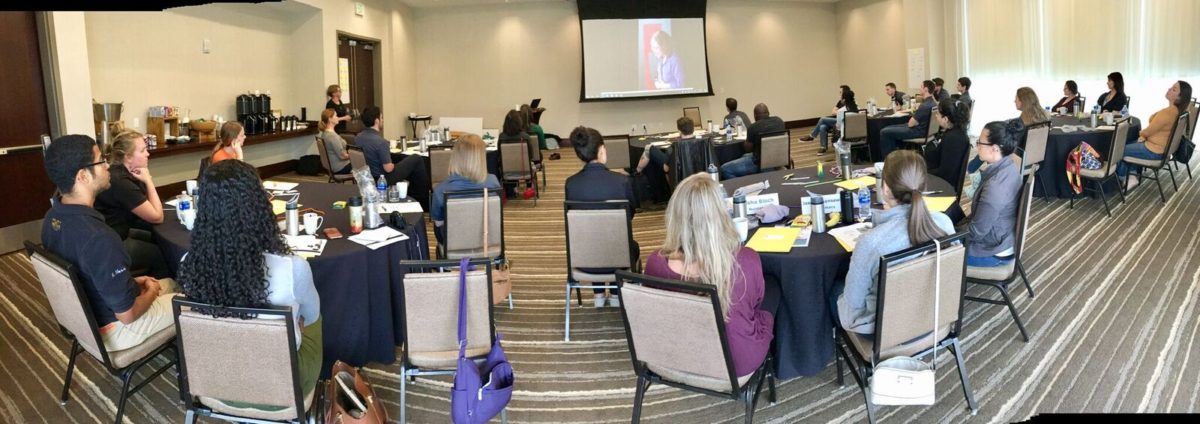It is time to change that, according to Resiliency Psychologist for the CU School of Medicine, Abbie Beacham, PhD. “Being in a professional training or a graduate school is extremely stressful,” she explains.
And so, on September 16 -a beautiful, sunny Saturday — a couple dozen student government leaders met indoors for a half-day session on mental resiliency led by Beacham. They, too, believe now is the time to learn the skills for resiliency.
Heather Ponicsan is the Student Senate Advisor, as well as a student herself, working on a master’s in Public Health and a doctorate in Nursing Practice. She’s also a practicing Psych nurse. “I know from being a student here for a long time and being in the professional field that there is huge burn out and the feeling that ‘maybe I am alone.’”
Lesson One from Beacham? It is normal to have both positive and negative affect (moods). Lesson Two: “You have the capacity to come back and come back and come back.”
Students spent the day discussing many aspects of mental resiliency that can guide them throughout their academic and professional careers. Homing in on the values that guide us. Measuring our perceived stress levels. Why grit matters. And how to manage in what is often a pressure cooker environment.
“There is huge burn out and the feeling that ‘maybe I am alone.’”~ Heather Ponicsan
They also practiced the simple but effective tools of mindfulness and meditation, and learned more about the research behind those tools. In her TEDx Talk, Harvard researcher Sara Lazar noted that studies have shown yoga and mindfulness to be successful in fighting mental illnesses. “Meditation can literally change your brain,” she said.
To see mindfulness in practice, they watched a slow-motion video of NBA point guard Stephen Curry shooting baskets. In it, it’s visually clear when he “resets” his mind for maximum effectiveness on the court.
“Mental health is such a major aspect of the overall wellbeing of students. It’s something that needs to be reinforced constantly,” said Cody Glickman, president of the Student Senate. “If healthcare providers and future healthcare providers can get this kind of training, they also can pass it forward to their patients.”
The training for student leaders is part of an ongoing mental health effort this year on the Anschutz Campus from the Center for Interprofessional Practice & Education, Office of Student Affairs and the National Behavioral Health Innovation Center. Other events will include a One Campus – One Read of “An Unquiet Mind” by Kay Redfield Jamison, suicide prevention trainings, Movie Night: “Touched With Fire”, hands-on demonstrations of virtual reality as a mental health tool, and student and faculty/staff panel discussions on overcoming mental illness stigma.
Among the core strategies laid out by Chancellor Don Elliman in his 2016/17 State of the Campus address is to “Go Big” in significantly expanding the campus’ work in mental health. It’s a topic of growing focus on the Anschutz Campus, and beyond.
“We talk about mental health a lot, not only here on campus but out in the communities, and it is being addressed a lot more this year,” said Ponicsan. “We talk about it all the time. How we don’t take care of one another. How we don’t take care of ourselves. We are trying to change that.”
It’s a longstanding problem, says Beacham. “The conundrum is that we expect our healthcare providers to be able to function at a high level but we pay less attention to mental wellness issues among our providers than we do in the general public.
“We expect that we heal ourselves,” she said. “We need to be more compassionate and caring for the caregivers.”
And with the ongoing mental health campus-wide effort, there is opportunity. “The big change that can happen is with events like this, while you are in school and you’re still learning,” said Ponicsan.
Read more about mental health initiatives on campus.
Share this Post

